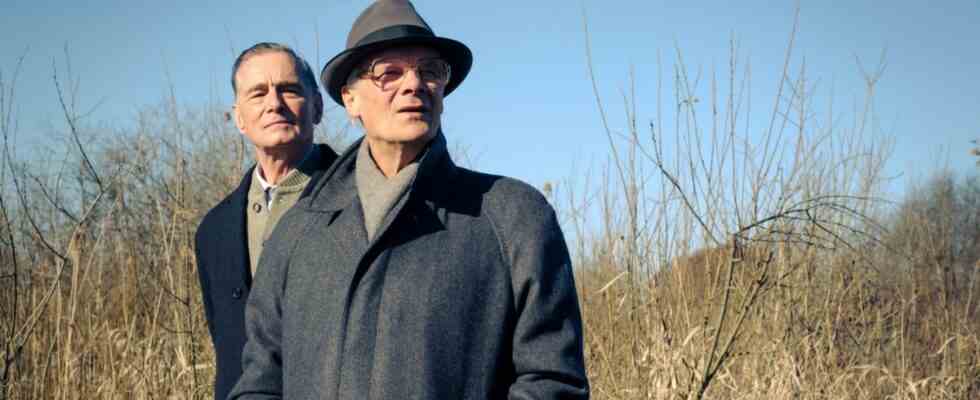Broadcast dates are set well in advance, so it’s coincidental that Jan Josef Liefers‘ Very good directorial work Honecker and the pastor comes to television at a time when the paradox of loving one’s enemy is more offensive and challenging than it has been in a long time. A time when two brother or sister nations are being forced into war, and one observes a ruler bombing himself out of the Kremlin sooner or later, anyway from the global political stage.
At this point, please flash back 32 years to January 1990. The GDR citizens just brought down the wall. Stasi people and comrades fled, and the Honecker couple, in power, stood on the doorstep of a Protestant vicarage. They are the hunted, homeless, hardly any luggage. A vicarage of all things.
With this film, which is largely a chamber drama, Jan Josef Liefers ventures into a piece of German history that seemed incredible then as it does today. Erich Honecker, the deposed ruler, is ill and has just had an operation. The couple can no longer return to the Wandlitz forest settlement, where the GDR leadership lived in isolation behind fences. Thus, in accordance with the core of the gospel, the church takes pity on both of them, against great resistance, even from within. A safe place must be found for Margot and Erich Honecker. Even if the greed for revenge is great, the former head of the Council of State should be brought to trial – not a short one, like the Ceauşescu couple in Romania, who had been put against the wall a few weeks earlier.
Margot Honecker had so many young people with broken souls on her conscience
With this prospect and in front of the shards of their dictatorship of the proletariat, Margot and Erich Honecker finally land Holmer family in Lobetal, north of Berlin. Holmers are ready to spell out the words charity, forgiveness, mercy and love of enemies in their own homes. Confessing Christians had a hard time in the atheistic state, pastor’s children anyway, and Margot Honecker, Minister for National Education, was almost more hated than her husband. She has on her conscience countless young people with broken educational paths and damaged souls, traumatized people from the “Jugendwerkhöfe”, re-education centers for the so-called difficult to train. Even Holmer’s older children – they have ten – were not allowed to take their A-levels and were subjected to harassment. Now Cornelius, the youngest, has to go shopping for the Honeckers, and Traugott, who is also at home, clears his room for the couple. He is the only one who is not afraid to openly show his contempt for Frau Honecker. “You have to be the Traugott,” asks Margot Honecker, demanding and pointed. “So I don’t have to do anything anymore,” replies Traugott, as if he had filtered out the entire confusing relief of the weeks after November 9, 1989 in this one sentence.
Barbara Schnitzler, the daughter of the GDR actor Inge Keller and TV presenter Karl-Eduard von Schnitzler, plays Margot Honecker (on the right Edgar Selge).
(Photo: Conny Klein/ZDF and Conny Klein)
Barbara Schnitzler plays Margot Honecker in such a way that at first you cry out inquiringly: Help, is she still alive? Schnitzler’s Margot enters the strange world of believers with steely self-confidence, but becomes softer, more questioning, more touchable.
And Eric? Edgar Selge doesn’t try to imitate the historical Honecker, the squeaky overtones of his voice, the stiffness, the stampedness. He gives this man, who believes he has always been “well informed”, his very own, rather quiet character, especially in the conversations with the pastor (Hans-Uwe Bauer), who cannot stop proselytizing his guest to ask for remorse, or to confront him with the truth about this just-defunct state. Where Uwe Holmer speaks of mercy, Honecker means solidarity. Where the pastor talks about the victims of the Stasi, Honecker says: “Anyone who had nothing to hide had nothing to fear.”
They talk past each other and yet come closer. And outside, at the fence of the vicarage, there are angry, yelling people with torches and want to see Honecker hanging or against the wall. Inside, in the dark of the attic room, he says to his wife: “They should shoot me like Ceaușescu. I don’t care. It won’t do them any good.”
When the time comes, people like the Holmers are wished to those in power in Moscow out of love for their enemies and mercy. There are also in North Korea, Belarus and Eritrea.
Honecker and the pastor, ZDF, 8.15 p.m. and in the ZDF Mediathek.

